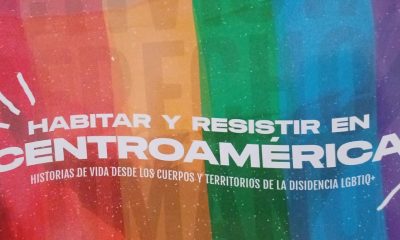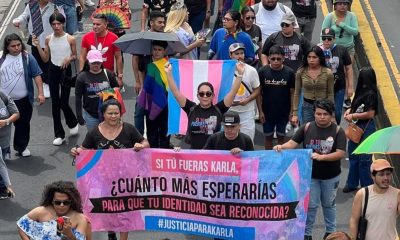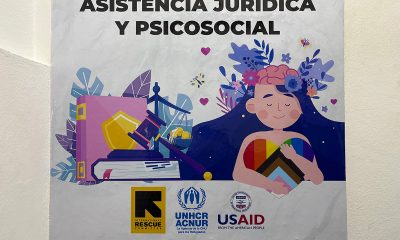World
Se celebró el Orgullo LGBTQ en El Salvador desde casa
El Salvador G organizó una celebración virtual
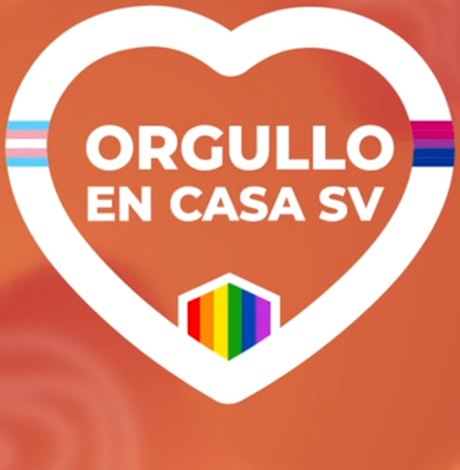
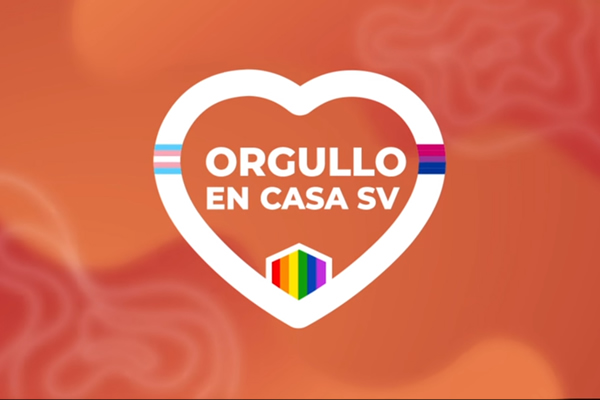
SAN SALVADOR, El Salvador — El Orgullo LGBTQ en El Salvador, se celebró en Internet al igual que en el resto mundo este año; debido a la pandemia que se está viviendo a nivel mundial, todas las instituciones que se encargan de la organización de la marcha en sus respectivos países comenzaron a tener reuniones virtuales para sondear la manera en cómo se podía solventar la celebración y mostrar el orgullo de manera virtual, sin exponer a nadie a salir a las calles como cada año.
En El Salvador, muchas de las organizaciones LGBTQ que están conglomeradas en la Federación Salvadoreña LGBTI han dedicado más tiempo a solidarizarse en la recolección de víveres y artículos de primera necesidad para apoyar a sus bases que se han visto afectadas, tanto por la pandemia, al igual que por las tormentas que han azotado al país. Una de estas organizaciones es Asociación Entre Amigos.
“Hemos estado trabajando en las emergencias, que no hemos tenido ni oportunidad de pensar que es junio, pero como Federación se realizó algo, al igual que otras organizaciones compañeras”, comentó al Washington Blade, William Hernández, director de Asociación Entre Amigos.
Por ello El Salvador G, un portal salvadoreño que se ha destacado durante 11 años como medio de comunicación de la población LGBTQ y al mismo tiempo siempre han participado de la celebración del Orgullo LGBTQ en el país, este año fue el encargado de llevar la celebración de manera digital.
“Desde febrero comenzamos a tener reuniones virtuales con nuestros pares organizadores del Pride en otros países, para ver cómo iban solventando en ese momento, como Australia y otros más”, informa al Blade, Nicolás Rodríguez, director de El Salvador G. “Propusimos que no se cancelaran las marchas, sino que se pospusieron a finales de año para aquellos países que no tienen invierno en esa época”.
Al tenerse una respuesta favorable de diversos colegas organizadores se acepta la cancelación en junio toda celebración de calle y se traslada a nivel virtual, “por ello se realizó el 27 de junio el Global Pride a nivel internacional, en donde El Salvador tuvo su participación por la noche y El Salvador G, lo transmitió en vivo”, comenta al Blade Rodríguez. “De ahí nace la idea de una maratón de videos llamada #OrgulloEnCasaSV, proyecto al cual se han sumado colectivos de artistas, colectivos de ONG’s, entre otros, por lo cual ha sido muy utilizado el hashtag”.
En esta iniciativa a través de la página de Facebook de El Salvador G, se estuvieron presentando diversas entrevistas en vivo a organizaciones, a gente histórica en el movimiento de El Salvador, que han contado un poco de la incidencia que se ha venido haciendo con el pasar del tiempo.
“La iniciativa de El Salvador G es muy buena, nosotras participamos de un conversatorio que se realizó y también con videos para El Orgullo en Casa SV”, expresó en una pequeña entrevista con el Blade, Karla Guevara, directora ejecutiva de la Asociación Colectivo Alejandría.
Por su parte COMCAVIS TRANS junto al Centro Cultural de España en El Salvador trabajaron en una muestra fotográfica virtual titulada “Diversificando nuestra existencia con el Orgullo”, para lo que la directora ejecutiva de la organización, Bianca Rodríguez, comentó al Blade que, “con este portafolio se pretende mostrar la situación de precariedad en que se encuentra inmersa la población bajo diferentes temáticas como el desplazamiento forzado, su cotidianidad, la situación laboral por el COVID-19, entre otros”.
De esa manera se visibilizó otro rostro del día del Orgullo, con las diferentes realidades que las personas LGBTQ, en especial personas trans, viven en El Salvador; al mismo tiempo se reivindica la existencia de cuerpos diversos y las diferentes expresiones del amor entre las personas, la muestra fotográfica aún está en línea a través de la página https://www.comcavistrans.org/.
El Ministerio de Cultura del Gobierno de El Salvador, presentó junto a la embajada de la República de Cuba y con el apoyo de la Asociación ASPIDH Arcoíris Trans, la 3ª Muestra Digital de Cine LGBTIQ+ El Salvador, la cual se presentó del 26 al 30 de junio, todas las producciones eran para un público mayor de 21 años, los enlaces para ver las películas eran solicitados por medio de mensajes privados al Facebook del Ministerio a las 8:00 p.m. de las fechas establecidas.
La muestra se inauguró con el estreno salvadoreño titulado “SoulMeet”, un corto de ficción dirigido por Jesús Vanegas; además, el documental salvadoreño “Rosa”, que fue considerado el mejor documental independiente en el Festival de Cine Independiente en New York, en 2006, el cual fue dirigido por Erika Saca, Chiki Vásquez y Orlando Álvarez.
A esta visibilidad en redes sociales, también se sumó la Iglesia Episcopal Anglicana de El Salvador, quienes del 22 al 27 de junio estuvieron publicando reflexiones bíblicas hechas por personas LGBTQ que pertenecen al Ministerio de Diversidad Sexual de la misma, cerrando el 28 de junio con una Eucaristía en línea dedica al Orgullo LGBTQ, en donde la predica principal fue dada por el coordinador de dicho ministerio y las oraciones llevadas por parte de las chicas y chicos del mismo.
Por medio de videos y un escrito, la Federación Salvadoreña LGBTI mostró su posicionamiento ante la conmemoración virtual del 28 de junio; video en el cual presentan datos históricos del porqué de la marcha en el país, al igual cifras de asesinatos a personas LGBTQ en el país, 145 registrados entre 2016 y 2018 y solo en los primeros meses de 2020 se registraron 4 asesinatos de personas gays y trans; según datos de la Secretaria de Inclusión Social a través de la Dirección de Diversidad Sexual, entes clausurados por el gobierno de Nayib Bukele.
Y aunque toda celebración de la diversidad existente y la reivindicación se trasladó al ámbito virtual este 2020, el objetivo principal sigue siendo el mismo,
“Las marchas han servido no solo para celebrar nuestra vida, sino también para manifestarnos y demandar nuestro reconocimiento como ciudadanas y ciudadanos que indistintamente de nuestras orientaciones sexuales, de nuestra identidad y/o expresión de género, somos seres humanos a quienes se nos debe garantizar el ejercicio pleno de nuestros derechos”, expresó en un vídeo compartido por la Federación Salvadoreña LGBTI, Erick Ortiz, coordinador general de Colectivo Normal y pre candidato a diputado por Nuestro Tiempo.
Ecuador
Justicia reconoce delito de odio en caso de bullying en Instituto Nacional Mejía de Ecuador
Johana B se suicidó el 11 de abril de 2023

A casi tres años del suicidio de Johana B., quien estudió en el Instituto Nacional Mejía, colegio emblemático de Quito, el Tribunal de la Corte Nacional de Justicia ratificó la condena para el alumno responsable del acoso escolar que la llevó a quitarse la vida.
Según información de la Fiscalía, el fallo de última instancia deja en firme la condena de cuatro años de internamiento en un centro para adolescentes infractores, en una audiencia de casación pedida por la defensa del agresor, tres meses antes de que prescriba el caso.
Con la sentencia, este caso es uno de los primeros en el país en reconocer actos de odio por violencia de género, delito tipificado en el artículo 177 del Código Orgánico Penal Integral (COIP).
El suicidio de Johana B. ocurrió el 11 abril de 2023 y fue consecuencia del acoso escolar por estereotipos de género que enfrentó la estudiante por parte de su agresor, quien constantemente la insultaba y agredía por su forma de vestir, llevar el cabello corto o practicar actividades que hace años se consideraban exclusivamente para hombres, como ser mando de la Banda de Paz en el Instituto Nacional Mejía.
Desde la muerte de Johana, su familia buscaba justicia. Su padre, José, en una entrevista concedida a edición cientonce para la investigación periodística Los suicidios que quedan en el clóset a causa de la omisión estatal afirmó que su hija era acosada por su compañero y otres estudiantes con apodos como “marimacha”, lo que también fue corroborado en los testimonios recogidos por la Unidad de Justicia Juvenil No. 4 de la Fiscalía.
Los resultados de la autopsia psicológica y del examen antropológico realizados tras la muerte de Johana confirmaron las versiones de sus compañeras y docentes: que su agresor la acosó de manera sistemática durante dos años. Los empujones, jalones de cabello o burlas, incluso por su situación económica, eran constantes en el aula de clase.
La violencia que recibió Johana escaló cuando su compañero le dio un codazo en la espalda ocasionándole una lesión que le imposibilitó caminar y asistir a clases.
Días después del hecho, la adolescente se quitó la vida en su casa, tras escuchar que la madre del agresor se negó a pagar la mitad del valor de una tomografía para determinar la lesión en su espalda, tal como lo había acordado previamente con sus padres y frente al personal del DECE (Departamento de Consejería Estudiantil del colegio), según versiones de su familia y la Fiscalía.
#AFONDO | Johana se suicidó el 11 de abril de 2023, tras ser víctima de acoso escolar por no cumplir con estereotipos femeninos 😢.
Dos semanas antes, uno de sus compañeros le dio un codazo en la espalda, ocasionándole una lesión que le imposibilitó caminar 🧵 pic.twitter.com/bXKUs9YYOm
— EdicionCientonce (@EdCientonce) September 3, 2025
“Era una chica linda, fuerte, alegre. Siempre nos llevamos muy bien, hemos compartido todo. Nos dejó muchos recuerdos y todos nos sentimos tristes; siempre estamos pensando en ella. Es un vacío tan grande aquí, en este lugar”, expresó José a Edición Cientonce el año pasado.
Para la fiscal del caso y de la Unidad de Justicia Juvenil de la Fiscalía, Martha Reino, el suicidio de la adolescente fue un agravante que se contempló durante la audiencia de juzgamiento de marzo de 2024, según explicó a este medio el año pasado. Desde entonces, la familia del agresor presentó un recurso de casación en la Corte Nacional de Justicia, que provocó la dilatación del proceso.
En el fallo de última instancia, el Tribunal también dispuso que el agresor pague $3.000 a la familia de Johana B. como reparación integral. Además, el adolescente deberá recibir medidas socioeducativas, de acuerdo al artículo 385 del Código Orgánico de la Niñez y Adolescencia, señala la Fiscalía.
El caso de Johana también destapó las omisiones y negligencias del personal del DECE y docentes del Instituto Nacional Mejía. En la etapa de instrucción fiscal se comprobó que no se aplicaron los protocolos respectivos para proteger a la víctima.
De hecho, la Fiscalía conoció el caso a raíz de la denuncia que presentó su padre, José, y no por el DECE, aseguró la fiscal el año pasado a Edición Cientonce.
Pese a estas omisiones presentadas en el proceso, el fallo de última instancia sólo ratificó la condena para el estudiante.
Africa
LGBTQ groups question US health agreements with African countries
Community could face further exclusion, government-sanctioned discrimination

Some queer rights organizations have expressed concern that health agreements between the U.S. and more than a dozen African countries will open the door to further exclusion and government-sanctioned discrimination.
The Trump-Vance administration since December has signed five-year agreements with Kenya, Uganda, and other nations that are worth a total of $1.6 billion.
Kenyan and Ugandan advocacy groups note the U.S. funding shift from NGO-led to a government-to-government model poses serious risks to LGBTQ people and other vulnerable populations in accessing healthcare due to existing discrimination based on sexual orientation.
Uganda Minority Shelters Consortium, Let’s Walk Uganda, the Kenya Human Rights Commission, and the Center for Minority Rights and Strategic Litigation note the agreements’ silence on vulnerable populations in accessing health care threatens their safety, privacy, and confidentiality.
“Many LGBTQ persons previously accessed HIV prevention and treatment, sexual and reproductive health services, mental health support, and psychosocial care through specialized clinics supported by NGOs and partners such as USAID (the U.S. Agency for International Development) or PEPFAR,” Let’s Walk Uganda Executive Director Edward Mutebi told Washington Blade.
He noted such specialized clinics, including the Let’s Walk Medical Center, are trusted facilities for providing stigma-free services by health workers who are sensitized to queer issues.
“Under this new model that sidelines NGOs and Drop-in Centers (DICs), there is a high-risk of these populations being forced into public health facilities where stigma, discrimination, and fear of exposure are prevalent to discourage our community members from seeking care altogether, leading to late testing and treatment,” Mutebi said. “For LGBTQ persons already living under criminalization and heightened surveillance, the loss of community-based service delivery is not just an access issue; it is a full-blown safety issue.”
Uganda Minority Shelters Consortium Coordinator John Grace said it is “deeply troubling” for the Trump-Vance administration to sideline NGOs, which he maintains have been “critical lifelines” for marginalized communities through their specialized clinics funded by donors like the Global Fund and USAID.
USAID officially shut down on July 1, 2025, after the White House dismantled it.
Grace notes the government-to-government funding framework will impact clinics that specifically serve the LGBTQ community, noting their patients will have to turn to public systems that remain inaccessible or hostile to them.
“UMSC is concerned that the Ugandan government, under this new arrangement, may lack both the political will and institutional safeguards to equitably serve these populations,” Grace said. “Without civil society participation, there is a real danger of invisibility and neglect.”
Grace also said the absence of accountability mechanisms or civil society oversight in the U.S. agreement, which Uganda signed on Dec. 10, would increase state-led discrimination in allocating health resources.
Center for Minority Rights and Strategic Litigation Legal Manager Michael Kioko notes the U.S. agreement with Kenya, signed on Dec. 4, will help sustain the country’s health sector, but it has a non-binding provision that allows Washington to withdraw or withhold the funding at any time without legal consequences. He said it could affect key health institutions’ long-term planning for specialized facilities for targeted populations whose independent operations are at stake from NGOS the new agreement sidelines.
“The agreement does not provide any assurance that so-called non-core services, such as PrEP, PEP, condoms, lubricants, targeted HIV testing, and STI prevention will be funded, especially given the Trump administration’s known opposition to funding these services for key populations,” Kioko said.
He adds the agreement’s exclusionary structure could further impact NGO-run clinics for key populations that have already closed or scaled down due to loss of the U.S. funding last year, thus reversing hard-won gains in HIV prevention and treatment.
“The socio-political implications are also dire,” Kioko said. “The agreement could be weaponized to incite discrimination and other LGBTQ-related health issues by anti-LGBTQ voices in the parliament who had called for the re-authorization of the U.S. funding (PEPFAR) funding in 2024, as a political mileage in the campaign trail.”
Even as the agreement fails to safeguard specialized facilities for key populations, the Kenya Human Rights Commission states continued access to healthcare services in public facilities will depend on the government’s commitment to maintain confidentiality, stigma-sensitive care, and targeted outreach mechanisms.
“The agreement requires compliance with applicable U.S. laws and foreign assistance policies, including restrictions such as the Helms Amendment on abortion funding,” the Kenya Human Rights Commission said in response to the Blade. “More broadly, funded activities must align with U.S. executive policy directives in force at the time. In the current U.S. context, where executive actions have narrowed gender recognition and reduced certain transgender protections, there is a foreseeable risk that funding priorities may shift.”
Just seven days after Kenya and the U.S. signed the agreement, the country’s High Court on Dec. 11 suspended its implementation after two petitioners challenged its legality on grounds that it was negotiated in secrecy, lacks proper parliamentary approval, and violates Kenyans’ data privacy when their medical information is shared with America.
The agreement the U.S. and Uganda signed has not been challenged.
European Union
European Parliament resolution backs ‘full recognition of trans women as women’
Non-binding document outlines UN Commission on the Status of Women priorities

The European Parliament on Feb. 11 adopted a transgender-inclusive resolution ahead of next month’s U.N. Commission on the Status of Women meeting.
The resolution, which details the European Union’s priorities ahead of the meeting, specifically calls for “the full recognition of trans women as women.”
“Their inclusion is essential for the effectiveness of any gender-equality and anti-violence policies; call for recognition of and equal access for trans women to protection and support services,” reads the resolution that Erin in the Morning details.
The resolution, which is non-binding, passed by a 340-141 vote margin. Sixty-eight MPs abstained.
The commission will meet in New York from March 10-21.
A sweeping executive order that President Donald Trump signed shortly after he took office for a second time on Jan. 20, 2025, said the federal government’s “official policy” is “there are only two genders, male and female.” The Trump-Vance administration has withdrawn the U.S. from the U.N. LGBTI Core Group, a group of U.N. member states that have pledged to support LGBTQ and intersex rights, and dozens of other U.N. entities.
-

 Massachusetts5 days ago
Massachusetts5 days agoEXCLUSIVE: Markey says transgender rights fight is ‘next frontier’
-

 Opinions5 days ago
Opinions5 days agoGay Treasury Secretary’s silence on LGBTQ issues shows he is scum
-

 New York5 days ago
New York5 days agoLawsuit to restore Stonewall Pride flag filed
-

 U.S. Military/Pentagon4 days ago
U.S. Military/Pentagon4 days ago4th Circuit rules against discharged service members with HIV

